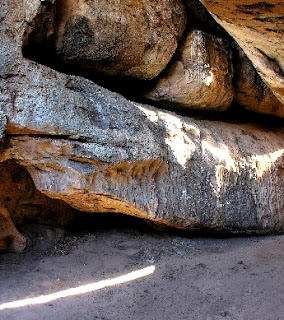  
|
Posted By Alice C. Linsley,
Saturday, November 25, 2017
|
Robert Runnels Williams is between his mother and father in front of the Williams's home in Redlands, California, 1915.

For since the creation of the world God's invisible qualities--his eternal power and divine nature--have been clearly seen, being understood from what has been made, so that people are without excuse." (Romans 1:20)
Focus question: Does faith play a role in scientific research and how Christians interpret data?
Alice C. Linsley
In the first installment of this 4-part series on The Bible and Science we noted that many significant breakthroughs in science and technology have been made by professing Christians. For some, success brought them conflict with religious leaders and secular scientists. Vindication came late for Copernicus and Galileo. The inventor of the MRI, Dr. Raymond Damadian, was denied a Noble Prize in Medicine because of his fundamentalist religious beliefs.
When it comes to biblical studies and scientific research, humility is a cardinal virtue. Those who have done the hard work deserve the credit, and the humble acknowledge the help they received from others. Sometimes they admit to serendipitous events or conversations that led them to seemingly miraculous breakthroughs.
Niels Bohr often spoke of the numinous dream that led to his discovery of the structure of the atom. August Kekule said he discovered the Benzene molecule after having a dream of a snake seizing its own tail.
In Toward the Conquest of Berberi, the chemist Robert R. Williams (the son of missionaries) recounts his chance meeting in the Philippines with U.S. Army doctor, Edward B. Vedder. Vedder had discovered that an alcoholic extract of rice bran cured infants who were dying from Berberi. He gave Dr. Williams a bottle of the extract and asked him to identify the substance responsible for its life-saving effect.Twenty-six years of research culminated in the synthesis of thiamine (vitamin B1) by Dr. Williams. The synthesis of this vitamin led to the eradication of Beriberi, a disease that killed millions in the Orient every year.
Read it all here.
Tags:
Alice C. Linsley
Permalink
| Comments (0)
|
  
|
Posted By Alice C. Linsley,
Monday, November 20, 2017
|
If Scripture is reliable and the empirical method is valuable, shouldn't the two work together for those who want to understand the Bible?
That question is addressed in the first of a series on "The Bible and Science" at Virtueonline.

Alice C. Linsley
It is often said that faith assertions cannot be proven by science, but that is a fallacy. A reader once wrote to tell me, "Science and beliefs do not mix." I responded that "Science begins in belief. One must believe something even to think scientifically."
Another reader shot off this remark, "The Bible and theology are not the enemy of the biological evolution; they are superfluous."
That's the sort of brainless remark one reads at many science sites "where graduate students, researchers, doctors and the 'skeptical community' go not to interpret data or review experiments but to chip off one-liners, promote their books and jeer at smokers, fat people and churchgoers? And can anyone who still enjoys this class-inflected bloodsport tell me why it has to happen under the banner of science?" -- Virginia Heffernan, The New York Times Magazine
Science, at its best, points us to what is real and true. Because that is so, we can expect good science to verify, confirm, and align with the data of Scripture. When something true is asserted evidence can be found to confirm the assertion.
Christians have nothing to fear from science. In a study published by the American Scientific Affiliation, it is estimated that 60% of the breakthroughs in science and technology have been made by persons professing to be Christian.
Read more here.
Tags:
Alice C. Linsley
Permalink
| Comments (0)
|
  
|
Posted By Alice C. Linsley,
Wednesday, March 22, 2017
|
I extend an invitation to the members of Christian Women in Science to join the conversation at a new Facebook group The Bible and Anthropology.
This international forum shares ideas, insights, discoveries, images, and documents that help the members gain a deeper understanding of the Bible through application of cultural anthropology. Anthropology degrees are not a prerequisite for participation! Share what you experience where you live and how the experience relates to Scripture. Help advance the scientific field of Biblical Anthropology.
Also, today I am celebrating the 10-year anniversary of my blog JUST GENESIS. If you have never visited the blog, please take a moment to look at the research there.

I ask your prayers for this research and for the up-coming Annual Conference in Golden, Colorado July 28-31. Go here to register for the conference.
Best wishes,
Alice C. Linsley
Tags:
Alice C. Linsley
anthropology
Permalink
| Comments (1)
|
  
|
Posted By Alice C. Linsley,
Saturday, September 26, 2015
|

77,000 year python carved into the side of a mountain in Botswana
The Age of the Earth and the Evidence of Human Occupation
Alice C. Linsley
Students often ask questions that pertain to things they have heard about the Bible or read in the Bible. Over the years I have collected commonly asked questions and provided answers from the perspective of Biblical Anthropology.
In this article, I focus on three questions: the age of the Earth, the time that humans have been on Earth, and how we are to understand the biblical figure of Adam.
Read it all here.
70,000 year old python stone carved into the side of a mountain in Botswana. The stone has over 300 indentations made by humans to give it the shape of a python.
70,000 year old python stone carved into the side of a mountain in Botswana. The stone has over 300 indentations made by humans to give it the shape of a python.
70,000 year old python stone carved into the side of a mountain in Botswana. The stone has over 300 indentations made by humans to give it the shape of a python.
Tags:
Alice C. Linsley
Biblical Anthropology
Permalink
| Comments (2)
|
  
|
Posted By Alice C. Linsley,
Saturday, September 5, 2015
|
To date, all the publications of the ASA about Noah have portrayed him as a Mesopotamian. There is much evidence to suggest that Noah was a Proto-Saharan who lived in the region of Lake Chad during the African Humid Period. This conversation presents both views, and the readers of our CWIS blog may find it interesting.
Was Noah Mesopotamian or Proto-Saharan?

Dufuna Canoe was discovered in 1987 by a Fulani cattle herdsman a few kilometers from the village of Dufuna, not far from the Komadugu Gana River in Yobe State, Nigeria. Radiocarbon dating of a sample of charcoal found near the site dates the canoe at 8500 to 8000 years [African Humid Period] linking the site to Lake Mega Chad. It is the oldest boat to be discovered in Africa, and the second oldest known worldwide. By comparison, Egypt's oldest boat is only about 5000 years old.
It is a black mahogany dugout found in the region of Lake Chad, in the Land of Noah. The Dufuna dugout was buried at a depth of 16 feet under clays and sands whose alternating sequence showed evidence of deposition in standing and flowing water. The dugout dates to 8000 years before the present.
What do you think, Ladies?
Alice C. Linsley
Tags:
Alice C. Linsley
Dick Fischer
Permalink
| Comments (0)
|
  
|
Posted By Alice C. Linsley,
Saturday, May 17, 2014
|
 | | Multiple security doors separate prisoners from the outside world. |
"I needed clothes and you clothed me, I was sick and you looked after me, I was in prison and you came to visit me."--Jesus Christ (Matthew 25:37)
Alice C. Linsley There are 14 women in the Saturday afternoon Bible study at the local prison. This is not a Bible study in the traditional sense. Only a few even bring a Bible. Instead we discuss what the Bible has to say about life issues. The women want to talk about anger, forgiveness, addiction, abuse, and guilt. They also want to hear about salvation, healing, God’s provision for them and the gift of eternal life. As a Biblical anthropologist, I tend to be scholarly in my approach to the Biblical text. Maybe that is why God opened this prison ministry to me. This brings me balance and reminds me of what really matters. The women in prison want something to carry them through the week; something to remind them that God cares about them and can be trusted. We keep it basic. We keep it real. They share their experiences of God’s presence in tragic circumstances and in emergency rooms where they were taken when they overdosed on drugs. They understand that the Bible is not the only way that God communicates. Many have never read the Bible and some have had bad experiences in churches. We are learning to hear God’s voice in non-Biblical terms, but always in terms consistent with Biblical revelation and doctrine. None of the women has ever asked about Darwin or the age of the Earth. None has asked about the extent of Noah’s flood and the geological record. These issues don’t seem to matter. Their need for God is basic to being human. They want to know why God delays in answering their prayers. They want to hear about something good and hopeful in the midst of their suffering. Why didn’t God stop my father from abusing me? Why couldn’t I say goodbye to my mother before she died? Where was God when my boyfriend attacked me? Can I trust God to take care of me when I get out of prison? Sometimes I share a tidbit from science. Once it was about how Nineveh was discovered and found to be as great a city as described in the book of Jonah. Another time I shared how analysis of the Biblical kinship records show that Jesus was a descendant of Ruth, a near-homeless woman who loved her aging mother-in-law so much she stayed by her side. The African American women are interested in knowing about Abraham’s Kushite ancestors. A few have asked whether or not God made some people homosexual. Each time I go to the prison I learn about the Bible from these women and I realize that the big debates that take place in scientific circles really are not big in the grander scope of things. For a person serving time, billions of years or 10,000 years are far less important that the number of days they have left to serve their prison term. Whether God created in six 24-hour days or through a long gradual process of evolution means little to someone yearning for God to create in them a new and contrite heart. Please pray for this prison ministry which meets on the third Saturday of each month.
Related reading: Haunting Pictures of Women Prisoners
Tags:
Alice C. Linsley
Bible
science
Permalink
| Comments (0)
|










